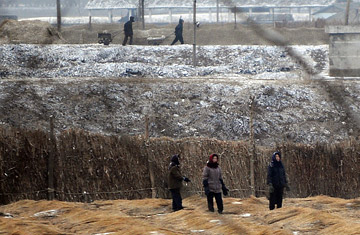
North Korean farmers work in their fields outside the North Korean capital of Pyongyang, February 25, 2008.
Nearly one million people starved to death when a murderous famine gripped North Korea in the 1990s. Now, the most backward, isolated country in the world may be about to see history repeat itself. According to diplomats, United Nations officials and a variety of non-government organizations, North Korea stands yet again on the brink of a major food shortage. "The prospect of hunger-related deaths in the next few months is approaching certainty," says Marcus Noland, a senior fellow at the Peterson Institute and co-author of a just released study raising alarms about the prospect of renewed famine. In fact, one Seoul-based NGO, the Research Institute for North Korean Society, asserts that there have already been a handful of people in small, agricultural villages who have died from starvation.
The emerging shortages demonstrate, again, how vexing it is for the outside world to deal with Kim Jong Il and his regime. Less than two weeks after U.S. intelligence officials in Washington presented evidence that Pyongyang had helped Syria build a nuclear reactor — a site destroyed by the Israeli air force last September — sources tell TIME that a team of U.S. diplomats and officials from the U.S. Agency for International Development is now in Pyongyang, as part of the overall nuclear talks, trying to negotiate an expedited package of food aid. The U.S. has proposed giving the North 500,000 metric tons of grain, but only if the North agrees to some monitoring of its distribution to ensure that the food is not diverted to the military or to the North Korean political elite.
The Bush Administration dangled the assistance last month as a carrot in front of Kim: if North Korea delivered a "satisfactory" declaration on its entire nuclear weapons program, as it agreed to do in the so-called six-party talks, the extra food aid from the U.S. would kick in. In the eyes of some current and former diplomats, the North never has come clean about all aspects of its nuclear program, but the urgency of the food situation has now apparently made that a secondary concern. "No one wants a rerun of the 1990s or anything close to that," says one east Asian diplomat. "The world won't stand for it, even if Kim Jong Il might."
There are several causes underlying the emerging crisis, experts say. One is the savage flooding North Korea experienced in August of last year, which devastated large swaths of farmland, thus limiting the North's own ability to produce grain. "The current balance between grain requirements and supply in the North is more precarious than at any time since the '90s," says Noland. Political tension, particularly between the North and new South Korean government of Lee Myung Bak, is also playing a role. Lee, a month after his inauguration earlier this year, decided he would continue Seoul's humanitarian assistance of food aid and fertilizer regardless of progress in the nuclear talks — but only if the North requested it. He has made all other economic dealings with Pyongyang contingent on the North's good nuclear behavior, and that has infuriated Kim.
